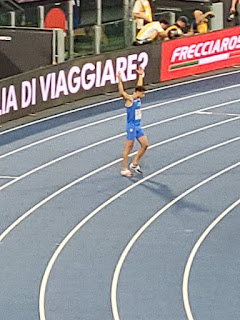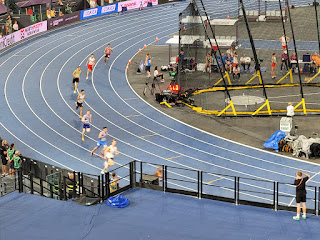Clicca qui per la versione italiana
With the weekend over, I have to face the rush-hour traffic again. So I arrive a little late: there is again a queue at the first entrance, but on the other hand there were so few people at the turnstiles that I feared they were closed. I had hoped to see at least the last heat of the decathlon's 10 , but nothing: I arrive that only the men's pole vault and the women's javelin qualifiers are in progress. I move towards the centre of the straight, so that I can see better not only the pole, but then also the decathlon's long jump and shot put. To my right, and almost to the end of the grandstand, is a large group of Estonians, chanting stadium choruses in honour of decathlete Oiglane and hurdler Magi. Many Germans and a few Frenchmen can also be seen, as well as the usual Britons, Swiss and Finns. Italians are almost hard to find this time, I don't see any near me. Surely, on a Monday morning, only those who would have been there even if these championships had been in Helsinki or Seville are present (and for a Monday morning they are not even very few).
In the pole vault and javelin, the trend of much of the morning is beginning to show: we seem to be going back a few years, with poor performances by Italians to which we were no longer accustomed. Disastrous was Botter in the javelin, with a qualification that would not have been impossible for her. In the pole vault, both Stecchi and Bertelli came out at 5.45, with the former making only one real jump in two heights. At 5.45 there are already a few illustrious victims, such as Sobera and the Polish former world champion whose name I will avoid writing down, at 5.60 after two attempts there are less than 12 to clear it, so it is clear that she will not go further (it had to be 5.75): in fact there are 13 left and it ends here. Duplantis makes only one jump, at 5.60, during a track competition, so hardly anyone notices (certainly not me), perhaps only those who came just for him. There is also the decathlon's LJ, and this time I can also see the jump-off and landing well, so I see that Dester always jumps off very far and does not go beyond 7.32. First Rooth with 8.01.
The track events start with the women's 200,
where Siragusa makes a good run. This is followed by the men's 1500, where the
Italians all pass and Meslek is good at dodging a massive fall. Then come the
women's 800, and here are the other disappointments: then Coiro loses third
place, the last for direct qualification, and it is immediately clear that the
heat is slow and has no hope of repechage, then Bellò goes off in the final
straight and finishes behind.
But then, fortunately, there are the 400
hurdles, first men's, then women's, and there the music changes. From my
position, when they pass through the straight in front of me, the athlete in
lane 9 I cannot see, of the one in lane 8 I can only see the head, of the one
in lane 7 half, only up to lane 5 do I see everything. And five of the six
Italians were in lanes 7 and up, even Warholm was in lane 8, at least Bol was
in lane 5. Warholm won without effort and at the finish line he sang ‘O sole
mio’, then came Sibilio's turn, and he was truly monstrous: he arrived in the
final straight with a clear lead and seemed to be strolling, looking left and
right, only in the final he accelerated a little to be sure of first place.
Despite everything, he does 48.07! He is asked to sing ‘O sole mio’ too, he
tries to evade it by declaring himself from Bolzano, but then sings it,
embarrassed.
Among the women, Folorunso finishes third, but
from her time, 54.52, it was clear that she would be repechaged, and so she
is. Then Olivieri arrives in the group, but she too drops below 55’ (54.99).
Muraro, who recovers in the final straight and gets to second place, then finishes third with 54.73, and is out by 7/100. In these two races alone, the Italians
made two personal bests and two season's bests: and to think that there was a
time not so long ago when they made one personal best and three season's bests
in an entire event (track and field events). Hard to believe today.
When the track events finish, there are still a
few shot puts in the decathlon. Normally in such cases the stadium would
empty out, but not here, because many are here for the multiple events. The
Italians finish in the last two places and in the overall ranking Naidon is
last, Dester 19th out of 24. Here, however, we cannot say that we seem to have
gone backwards, because once upon a time they did not even qualify.
At lunch, in a Sicilian restaurant, I meet a
group of Estonians and also around Rome one sees many people here for the
European Championships. I return to the stadium area at around 7.30 p.m.: this
time we enter quickly at the pre-filtering and at the gates. I look for the
merchandising shop in the fan zone, but I can't find it, and yet I thought I
had seen it the other days, and above all it seems impossible that there isn't
one. There is however one inside the stadium: I buy a T-shirt and cap. At the entrances
and in the bars they speak to you in English, by now they are used to Italians
being a minority. To make it clearer that I am Italian I paint my cheeks.
The first final is the women's pole vault, and
here I understand even less. At 4.58 there are 7 left, including Molinarolo and
Bruni, the only ones not to have cleared them on first. At 4.68 I am
convinced that only Stefanidi and Cadbury are left, until I see Moser clear 4.78, which is the measure of victory. I later find out that she had also
cleared 4.68 onsecond and had moved to 4.78 after a fault at 4.73.
Before the start of the track events I go
to get some food, and this time I do it quickly, there is hardly anyone there.
The track events start with the semi-finals of the women's 200: Kaddari hides
behind Neita in the bend, but then in the straight she gives in and finishes
fifth with 22.98. One entered the final with 22.84, it was not impossible, We then
come to the first Italian hope: the men's 400. Sito remained in the fight for
first place until the final straight, then 50-60 metres from the end he began
to run strangely, so much so that I thought he had hurt himself and would
retire. Instead he finishes fifth in 45.04. From his interview and a similar
situation in the women's race I understand that he had just packed it in. He
says ‘I'm not looking for excuses’, so I do it for him: the first three (but
not the fourth) had all been exempted from the first round.
Meanwhile, the last field event, the women's
hammer, began. Fantini, who throws first, is third after the first throw, but
on the second she takes the lead. On the fourth she is overtaken first by
Frenchwoman Loga, who was seventh, then by the multiple Polish champion, whose
name you will understand if I do not write it down, but she takes the lead again,
and this time by more than a metre: 77.14. The pole vault ends while the hammer
is still in the fourth round, so you can follow it closely. In the last two rounds,
the situation remains unchanged: Fantini gold, Italian and Polish flags are
mixed in the celebrations.
Meanwhile, the track races continue with the men's 3000 steeplechase. As the race is tactical Ossama Zoglhami goes into a breakaway on the third lap. The announcer compares him to Panetta, but Panetta was able to keep an unsustainable pace for everyone else, he is not. They catch him at the beginning of the last lap: at first he seems to react, but then he finishes eighth. The 400 decathlon followed: Dester was placed in the weakest heat, dominated it, but with 48.43, far from his personal best, Naidon competes in the middle heat and finished last. The day ended with Skotheim leading, Dester 12th and Naidon 19th (out of 23).
With the hammer also finished, we come to the main event, the final of the men's 200. At the entrance to the straight, Tortu and Desalu also dream of a one-two finish. Yes, there is a Swiss ahead front, a certain Mumenthaler, but I am sure that Tortu will catch him. Instead the Swiss wins, in what is surely the biggest surprise of these championships so far, Tortu despairs, also because of the time: it was won in 20.38 and he came second in 20.41. With the time with which he had finished third two years ago, he would have won, with the one with which Desalu had finished sixth in 2018, he would have won widely (it was 20.13)-
It ends up that Italians and Swiss leave the stadium in shock, for opposite reasons. And tomorrow is the longest day, where there is also Gimbo.






































